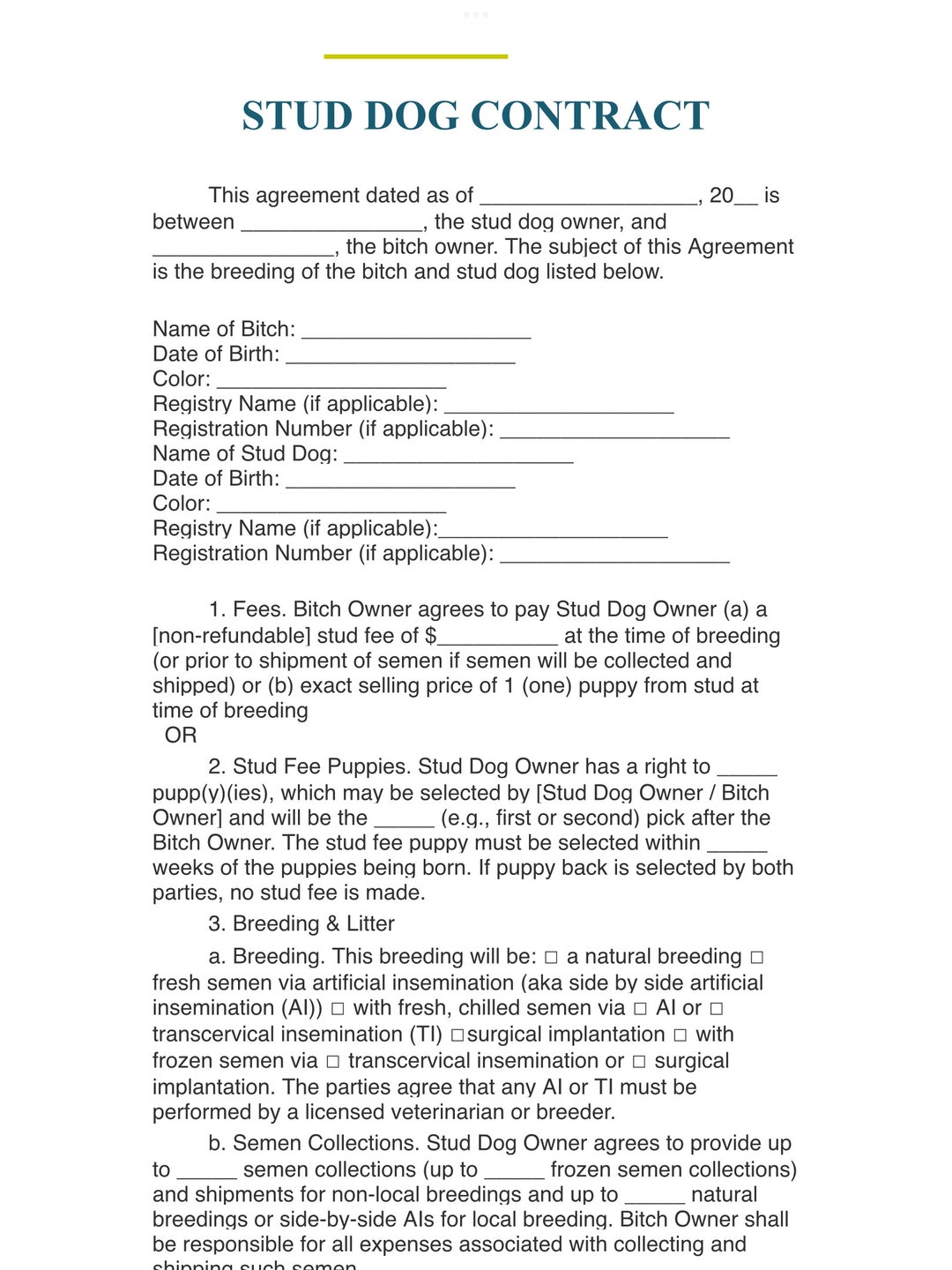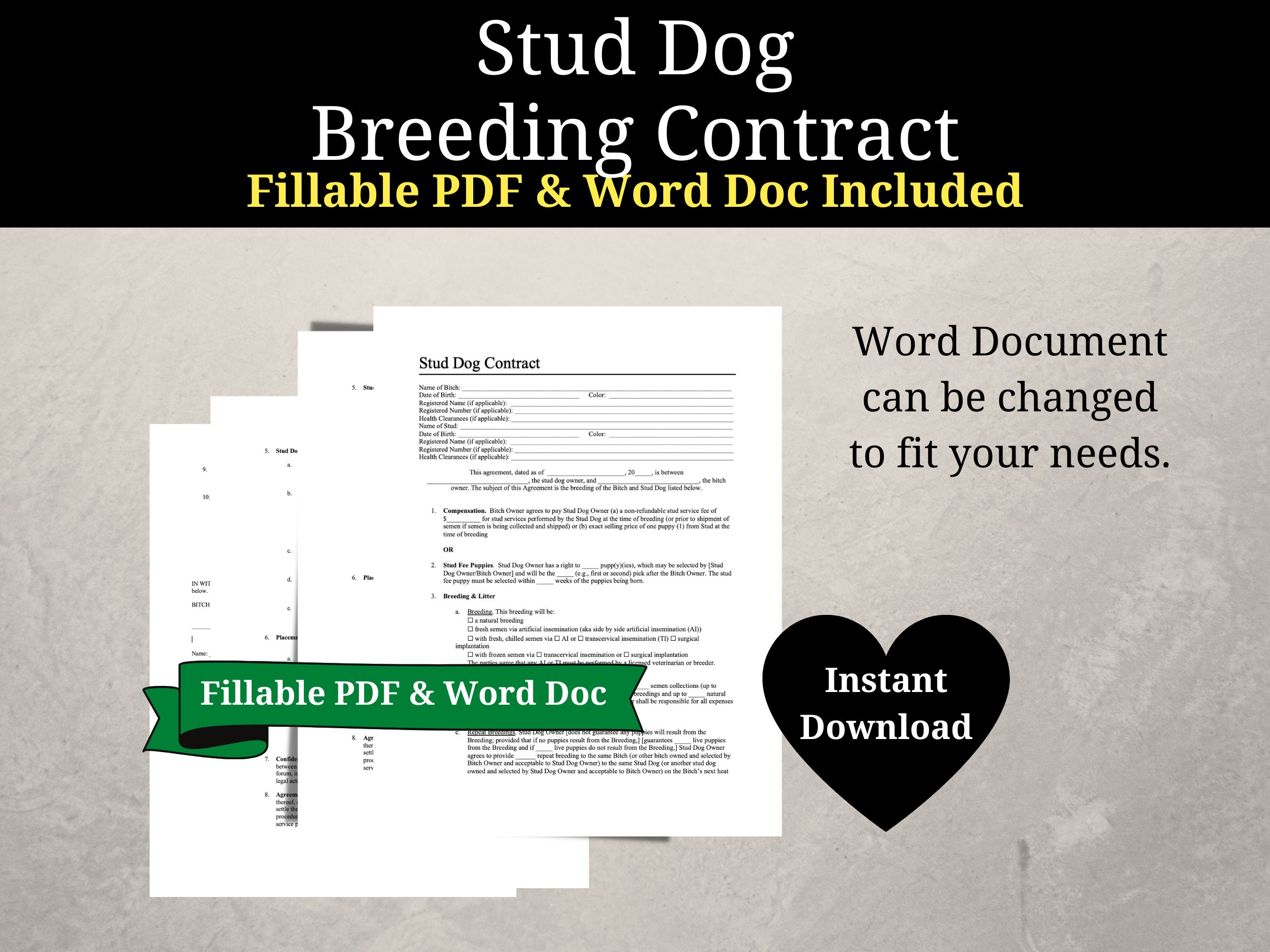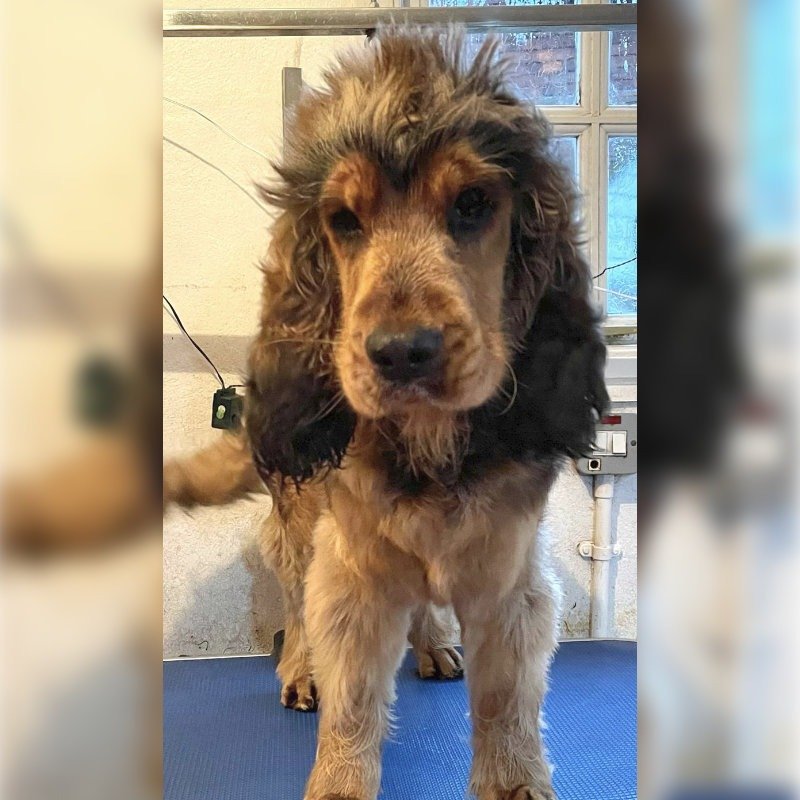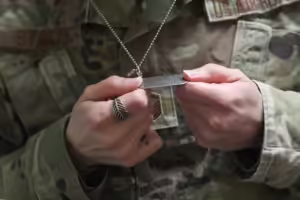Paying for a stud dog happens at specific times during the breeding process. Understanding when and why this payment occurs is important for dog owners. So let’s jump in deep: When Do You Pay for a Stud Dog?
Breeding dogs can be both exciting and complex. A stud dog is a male dog chosen for breeding. Owners often wonder about the costs involved. These costs can vary based on the dog’s pedigree, health, and reputation. Some owners pay a fee upfront, while others might pay after successful breeding.
Knowing when to pay helps avoid confusion later. It also helps ensure that both parties feel satisfied with the arrangement. This guide will help clarify when payment is due and what factors to consider. Understanding these details can lead to a smoother breeding experience.
Table of Contents
Introduction To Breeding And Stud Dogs
Breeding dogs is a big responsibility. Choosing a stud dog is one of the most important steps. A stud dog is a male dog used for breeding. Selecting the right stud can affect the health and quality of the puppies. Understanding how to navigate this process is essential for any breeder.
Importance Of Selecting The Right Stud
Choosing the right stud dog is crucial. A good stud dog can provide many benefits:
- Genetics: The stud’s genetics impact the puppies.
- Health: A healthy stud helps produce healthy puppies.
- Temperament: The stud’s behavior affects the puppies’ behavior.
- Breed Standards: A stud should meet breed standards.
Consider the following factors:
- Pedigree: Look into the dog’s lineage.
- Health Tests: Ensure the dog has health clearances.
- Temperament Evaluation: Assess the dog’s personality.
- Experience: Check if the stud has previous successful litters.
Basics Of Breeding Agreements
A breeding agreement is important. It protects both parties involved. Here are key elements to include:
| Element | Description |
|---|---|
| Stud Fee: | The cost for using the stud dog. |
| Number of Ties: | How many times the stud will breed. |
| Guarantee: | Conditions for a guaranteed puppy. |
| Ownership: | Who owns the puppies after birth. |
Make sure to read and understand the agreement. Clear terms help avoid confusion. Document everything to protect both parties.

Credit: www.etsy.com
Initial Considerations For Stud Services
Choosing a stud dog is an important decision. Several factors influence when and how much you pay for stud services. Understanding these factors can help you make the right choice.
Health And Genetic Screening
Health is crucial for any breeding program. A healthy stud dog increases the chances of healthy puppies. Here are some key health tests to consider:
- Hip Dysplasia: Check for hip joint issues.
- Eye Tests: Ensure clear vision and no genetic eye disorders.
- Genetic Screening: Test for hereditary diseases.
- Heart Checks: Assess heart health for potential issues.
Ask the stud owner for health clearances. These documents prove the dog’s health status. Investing in a healthy dog can save money in the long run.
Stud Dog’s Pedigree And Progeny
The pedigree of a stud dog shows its lineage. A strong pedigree often indicates quality. Look for:
- Champion titles in the lineage.
- Performance records in competitions.
- Health history of previous offspring.
Consider the stud dog’s previous puppies. Research their quality and health. A stud with successful progeny can raise the value of your breeding program.
Always weigh these factors before making a choice. A well-researched decision leads to better outcomes.
Understanding Stud Fees
Stud fees are the costs involved when breeding a female dog with a male, known as a stud dog. These fees can vary widely. Understanding them helps you budget for breeding. Knowing what to expect is key for dog owners.
Types Of Stud Fees
Stud fees can come in different forms. Here are the main types:
- Flat Fee: A one-time payment for breeding rights.
- Pick of the Litter: The owner receives a puppy from the litter.
- Percentage of Litter Sales: The stud owner gets a share of each puppy sold.
Factors Influencing Stud Fee Costs
Several factors affect the cost of stud fees. Here are the key points:
- Breed: Some breeds are more popular and costly.
- Pedigree: A dog with a strong lineage can demand higher fees.
- Health Testing: Studs with health clearances may charge more.
- Experience: An experienced stud may have a higher fee.
- Location: Fees can differ by region or country.
Understanding these factors helps in making informed decisions.

Credit: www.etsy.com
Negotiating The Breeding Contract
Negotiating a breeding contract can feel overwhelming. Understanding key terms helps you protect your interests. Clear agreements lead to better outcomes for both parties. Focus on essential aspects for a smooth process.
Key Terms And Conditions
Every breeding contract should include specific terms. These terms outline expectations and protect both parties. Here are some key terms to consider:
- Stud Fee: The fee for using the stud dog.
- Payment Schedule: When and how payments are made.
- Breeding Rights: Who retains rights to the puppies.
- Health Guarantees: Guarantees about the health of the stud.
- Return Breeding: Conditions for a second breeding if needed.
Expectations And Responsibilities
Both parties must understand their roles. Clear expectations lead to a successful breeding.
| Party | Expectations | Responsibilities |
|---|---|---|
| Stud Owner | Provide a healthy and proven stud. | Ensure all health tests are up to date. |
| Bitch Owner | Provide a healthy bitch for breeding. | Pay fees as agreed in the contract. |
Both parties should communicate openly. Discuss any concerns during negotiations. This helps avoid misunderstandings later. A well-written contract protects everyone involved.
Optimal Timing For Payment
Knowing when to pay for a stud dog is important. Timing can affect your budget and the breeding process. Here’s a breakdown of the optimal times to make your payment.
Before Mating
Paying before mating is a common practice. This ensures the stud dog is reserved for your female. Here are some key points:
- Establish a contract with the stud owner.
- Discuss the fee and payment terms.
- Confirm the stud’s availability.
Payments before mating can vary. They may be partial or full payments. Some owners may ask for a deposit. This secures your spot in the breeding schedule.
After Confirmation Of Pregnancy
Another option is to pay after confirming pregnancy. This can provide peace of mind. You only pay if the breeding was successful. Consider these factors:
- Verify pregnancy with a vet.
- Discuss payment terms with the stud owner.
- Understand the risks of waiting.
Payments after confirmation can be higher. The stud owner may charge more. This compensates for the risk of unsuccessful breeding. Be sure to have a clear agreement.

Credit: studdogsonline.com
Handling Unsuccessful Mating Attempts
Unsuccessful mating attempts can be stressful for dog owners. Understanding your options is vital. Knowing how to handle these situations can save you time and money.
Return Services And Refunds
If a mating attempt fails, check the breeding agreement first. Many agreements include return services. This means you can use the stud dog again at no extra charge.
Some breeders may offer partial refunds. This depends on the terms you agreed upon. Always ask questions if you are unsure.
Here is a simple breakdown of possible return services:
| Service | Description |
|---|---|
| Free Return | You can use the stud dog again for no fee. |
| Partial Refund | A portion of your fee is returned to you. |
| No Refund | Some agreements do not allow for any refunds. |
Revisiting The Breeding Agreement
Review the breeding agreement after an unsuccessful attempt. This document outlines your rights and responsibilities. Look for terms related to mating failures.
Important points to consider include:
- Stud fee details
- Return services offered
- Time limits for re-breeding
- Health guarantees for the stud dog
Discuss any concerns with the breeder. Clear communication can help resolve issues. Ensure both parties understand the agreement fully.
Additional Costs To Consider
When considering the cost of a stud dog, many forget about additional expenses. These costs can add up quickly. Understanding these expenses helps you plan better.
Veterinary Care And Testing
Before using a stud dog, you may need certain veterinary checks. These ensure the dog is healthy and fit for breeding. Key tests include:
- Health examinations
- Genetic testing
- Screening for diseases
Veterinary costs can vary. Here’s a rough estimate:
| Service | Estimated Cost |
|---|---|
| Health Examination | $50 – $150 |
| Genetic Testing | $200 – $400 |
| Disease Screening | $100 – $300 |
These costs ensure you choose a healthy stud dog. They protect the future puppies, too.
Travel And Accommodation For Mating
Travel expenses can also add to the costs. You may need to travel to the stud dog’s location. Consider these factors:
- Distance to travel
- Fuel or airfare costs
- Accommodation fees
Here’s a simple breakdown of potential costs:
| Expense Type | Estimated Cost |
|---|---|
| Fuel | $20 – $100 |
| Airfare | $150 – $500 |
| Hotel Stay | $75 – $200 per night |
Plan for these travel costs. They can be significant. Always have a budget in mind.
Finalizing The Deal
Finalizing the deal for a stud dog involves several important steps. It ensures both parties agree on the terms. Clear communication and proper documentation are key. Below are essential elements to consider.
Securing Payment Methods
Choose a secure payment method. This protects both the buyer and the seller. Here are some common options:
- Cash: Immediate and straightforward.
- Bank Transfer: Safe and traceable.
- PayPal: Convenient for online transactions.
- Checks: Ensure they are cleared before the transaction.
Discuss payment terms before finalizing. Agree on how and when the payment will be made. This helps avoid misunderstandings.
Receipts And Record Keeping
Keep clear records of the transaction. This includes receipts and contracts. Document these details:
| Item | Details |
|---|---|
| Payment Amount | Document the total amount paid. |
| Date of Payment | Record the date when payment was made. |
| Payment Method | Note the method used for payment. |
| Contact Information | Keep contact details of both parties. |
Always request a receipt after payment. This proves the transaction took place. Good record keeping protects you in case of disputes.
Frequently Asked Questions
When Should I Pay For A Stud Dog?
Typically, you pay for a stud dog once you confirm the breeding agreement. This payment often occurs before or at the time of the breeding. Some breeders may require a deposit to secure the stud’s services, with the remaining balance due upon successful mating.
What Factors Affect Stud Dog Fees?
Stud dog fees can vary based on several factors. These include the dog’s pedigree, health testing results, and show titles. Additionally, the demand for the breed and the dog’s success in competitions can also influence pricing. Always discuss fees and services with the breeder beforehand.
Can I Negotiate Stud Dog Prices?
Yes, negotiating stud dog prices is possible in some cases. Many breeders are open to discussions, especially if you have a reputable breeding history. However, always approach negotiations respectfully. Consider the value of the stud’s lineage and achievements to justify your request.
What Should I Know Before Using A Stud Dog?
Before using a stud dog, ensure you understand the breeding process. Research the dog’s health clearances and pedigree. Discuss any specific terms with the owner, including fees and conditions. Proper preparation can help ensure a successful breeding experience and healthy puppies.
Conclusion
Deciding when to pay for a stud dog is important. Consider the dog’s pedigree, health, and temperament. Research the breeder and their reputation. Understand the costs involved, including potential vet bills. Always ask about contracts and guarantees. This choice impacts your breeding plans and future puppies.
Take your time to make the best decision for your needs. A well-informed choice leads to better results and happier dogs. Happy breeding!



